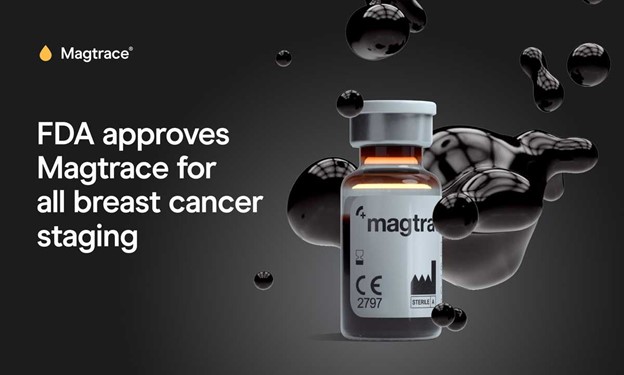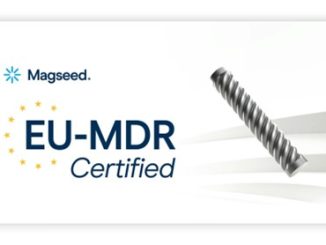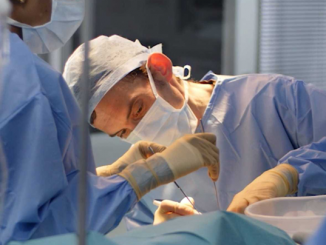
Endomag’s mission to deliver a better standard of breast cancer care to patients around the world has taken another huge step forward, with the news that Magtrace has now received PMA approval for use in all breast surgery procedures.
Back in 2018, Magtrace was initially approved for patients undergoing a mastectomy procedure. Since that original submission, additional data has been submitted to the FDA which has now validated its use for all breast cancer patients, leading to an expansion to all patients choosing breast conserving surgery too.
This news is a major milestone for both breast cancer patients and physicians across the US, helping to improve access and reduce the reliance on nuclear medicine alternatives.
In recent months, global shortages of radioisotopes have led to significant nuclear medicine supply chain issues. This has caused hospitals to suffer delays, and in some cases cancellations to cancer patient surgeries.
One of the greatest advantages of Magtrace over the current standard practice of using a radioactive tracer combination is that it removes those problems completely. It is easily accessible, simple to store and provides more flexibility, helping to unlock uniquely advanced surgical techniques such as ‘delayed’ sentinel lymph node biopsy.
“In the past month, there have been a lot of breast cancer patients across the US who have had their surgery delayed due to the ongoing shortages of Technetium-99,” said Michael Alvarado MD, Professor of Surgery at UCSF. “Fortunately, we were the first site in the US to adopt Magtrace several years ago, so we’ve been able to completely avoid these issues.”
“What originally drew me to Magtrace were the huge benefits it could provide to our patients, including eliminating the pain of a radioactive injection and reducing unnecessary surgery.”

This news comes hot on the heels of recommendation guidance from the National Institute for Health and Care Excellence (NICE) in England earlier this year, which recognized Magtrace as a ‘significant breakthrough in scheduling efficiency and patient experience for hospitals’.
With more than 500 centers worldwide now using Magtrace in over 40 countries, the argument to switch to a completely magnetic, non-radioactive approach grows stronger and stronger every day.
“This much-anticipated approval allows any surgeon, regardless of hospital setting, to offer their patients the best standard of treatment in breast cancer staging. For the first time in the US, operating departments will not have to rely on Nuclear Medicine before they can operate on their patients.

The Magtrace lymphatic tracer has officially received a guidance recommendation from the National Institute of Health and Care Excellence (NICE), for use in sentinel lymph node biopsies.
In their recommendation, NICE acknowledged that switching to a magnetic tracer could represent a significant breakthrough in scheduling efficiency and patient experience for hospitals.
Magtrace is a non-radioactive alternative to radioactive tracers, which helps to simplify breast cancer staging, by making it more convenient and widely available for physicians and patients, without compromising on clinical effectiveness.
This new guidance – as reported on the radiology specialist website, Aunt Minnie – recommends
Magtrace as an effective solution for wide-scale use, especially across facilities with limited or no access to radiopharmacy.
NICE considered data from 36 studies, including over 4,202 patients, half of the reported Magtrace patients in clinical studies, to reach their recommendation.
Reaction from the experts
“This is a great example of NICE driving innovation into the hands of professionals to improve care” explained Jeannette Kusel, Acting Director for MedTech and Digital at NICE, speaking back in March about the draft version of this recommendation.
With recent physician worries of difficulties in accessing radioactive tracers, and well-known issues with Monday start times for sites using them, this news could not be more timely.
Long-time users of Magtrace, including Mr Peter Barry of the Royal Marsden Hospital, have seen these benefits over many years and are excited for the opportunities this news brings for even wider adoption.

Mr Peter Barry
Consultant Oncoplastic Breast Surgeon at the Royal Marsden
Receiving this recommendation and becoming the first lymphatic tracer to be noted by NICE is a huge step in demonstrating how a future without the burden of radioactive tracers is both feasible and highly effective, thanks to the advanced components of magnetic tracers.
For more information see: https://www.endomag.com/about/


